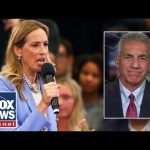In the bustling heart of New York City, tensions are on the rise as protesters prepare to demonstrate during a critical address by Israel’s Prime Minister, Benjamin Netanyahu, at the United Nations. This event comes at a time when Netanyahu is expected to call out various nations that have recently recognized Palestinian statehood, a move that has stirred up strong reactions worldwide. Meanwhile, President Donald Trump has made a bold statement, asserting that he will not allow Israel to annex the West Bank during his tenure. This firm position signals a significant moment in the ongoing discourse surrounding Israeli-Palestinian relations.
In a related development, retired four-star General Jack Keane has returned from a visit to Israel and made some notable observations about the current situation there. He remarked on the overwhelming pro-American sentiment among Israelis, crediting the robust support from the U.S. both with military aid and strategic interventions. This unwavering backing has led to an energetic appreciation for Trump, with many in Israel keenly following the discussions surrounding their nation on outlets like Fox News, which plays incessantly in the background of everyday life there.
Keane elaborated on the challenges Israel faces today, particularly in relation to Hamas in Gaza and Hezbollah across the border in Lebanon. He highlighted the importance of maintaining pressure on Hezbollah, which has launched over 1,000 attacks, and the necessity to prevent any military buildup in southern Lebanon. In a twist that few would have anticipated, Lebanon is reportedly considering disarming Hezbollah, a significant change in the political landscape. The general also pointed out ongoing concerns about Iran’s nuclear ambitions, indicating that Israel is prepared to respond decisively if necessary, with clear support from the American government.
As discussions about the future of Gaza continue to evolve, there are whispers about the possibility of relocating some Gazans to other countries. Netanyahu’s approach has drawn comparisons to historical figures like Winston Churchill, praised for his unwavering resolve in difficult times. The Prime Minister’s clarity of purpose and ability to focus on key objectives have garnered respect and support from Trump, who is providing guidance as these issues unfold.
In an additional twist in the news cycle, Trump has expressed a noticeable shift in his stance on the ongoing conflict in Ukraine. His recent commentary on social media reflects a new level of conviction regarding Russia’s protracted military engagement. With a blend of skepticism and determination, he has emphasized the need to reevaluate U.S. support strategies, advocating for increased military aid to Ukraine to counter Russian advances. This move showcases a potential strategic pivot that not only aims to assist Ukraine but also seeks to contain the perceived threat from Russia, presenting a multi-faceted approach to international leadership.
As events unfold, the stakes have never been higher, both in the Middle East and in the context of U.S.-Russia relations. The world observes with bated breath, waiting to see how these intricate geopolitical dynamics will play out. With vocal leaders and passionate protests, the landscape is charged with potential and uncertainty, reminding us that the thread of diplomacy is often woven with both bold action and careful negotiation.




